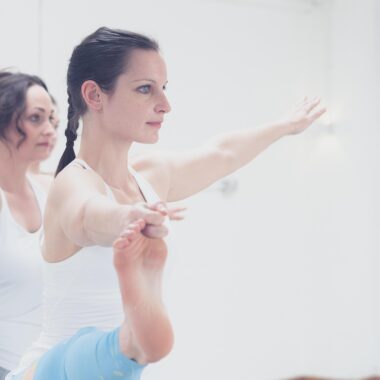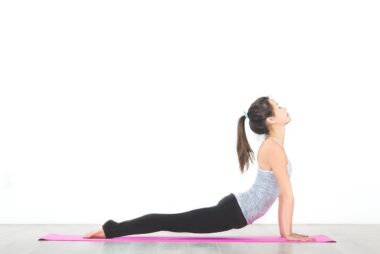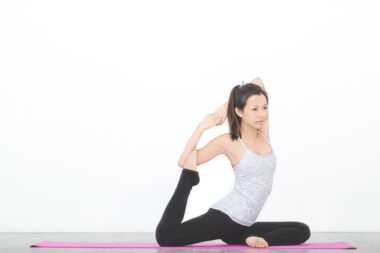The Psychological Benefits of Improving Flexibility in Functional Fitness
Flexibility is often overlooked in fitness yet plays a vital role in enhancing mental well-being. It allows individuals to move freely, which greatly contributes to their overall mood and emotional state. When people engage in flexibility exercises, they release tension that has built up in their bodies. This release not only improves physical capabilities but can also lead to a profound sense of relaxation. Stress often manifests physically, and by maintaining or improving flexibility, one reduces the physical implications of stress, resulting in a better mental balance. Moreover, consistent practice of flexibility movements can lead to reduction in anxiety and depression. These enhancements are linked to the endorphins released during exercise, creating a positive feedback loop. Additionally, flexibility is crucial for balance, coordination, and overall functional performance, which can further boost confidence in various health-related areas. Feeling capable of performing everyday tasks without discomfort can significantly uplift one’s mood, leading to an enriched outlook on life. Thus, integrating flexibility exercises into routine fitness programs can have a far-reaching effect on psychological health, beyond just physical benefits, significantly enhancing the quality of life.
One of the notable psychological benefits of flexibility exercises is their contribution to improved self-esteem. When individuals dedicate time to enhance their flexibility, they often see gradual progress. This progress fosters a sense of achievement and boosts self-confidence, especially among beginners. Learning to perform stretches and flexibility movements increases individuals’ acceptability of their bodies, leading them to appreciate their capabilities. Moreover, as flexibility workouts often focus on mindfulness and body awareness, practitioners become more attuned to their physical state and emotions. This heightened awareness can reduce negative self-talk and promote a more compassionate inner dialogue. Understanding one’s body can lead to a further reduction in anxiety levels, encouraging a positive state of mind. Yoga and similar practices also emphasize the connection between the mind and body, often incorporating meditative elements that encourage deep breaths and relaxation. Consequently, this engagement cultivates a space for emotional healing and introspection. Many individuals report feeling calmer and more centered post-exercise, which can directly impact their daily mental health. Therefore, promoting flexibility not only aids physical capabilities but also signifies an essential step in enhancing overall psychological resilience.
Another aspect often associated with flexibility exercises is their potential to improve focus and concentration. Engaging in these movements requires a degree of mental presence and awareness, fostering mindfulness. When individuals practice flexibility routines, they tend to focus on their breathing patterns and body positions, distancing themselves from daily distractions. This mental discipline learned through flexibility exercises can translate into improved focus in other areas of life, such as work or studies. As one improves physical flexibility, this can lead to enhanced cognitive functions, such as memory and attention span. The practice of focusing solely on the body combats the constant influx of stress and worries, clearing mental clutter. For many practitioners, this state of mindfulness achieved through flexibility helps ease racing thoughts, allowing for greater mental clarity. Additionally, many find that having regular flexibility sessions prevents mental fatigue by providing a refreshing break from more intense workout routines. This balance in approach also alleviates symptoms of burnout as it encourages taking time to reconnect with oneself, which is vital for maintaining psychological health. Therefore, incorporating flexibility into any fitness regimen can significantly enhance mental acuity and overall satisfaction in daily life.
Flexibility and Emotional Resilience
Emotional resilience refers to an individual’s ability to navigate through stress and adversities. Flexibility exercises, especially when practised in calming environments, help bolster this resilience. Engaging in stretching routines allows the body to release both physical and emotional tension. As muscles loosen, so does the mind, often leading to clearer emotional expression. When tension dissipates through movement, individuals may find themselves more equipped to handle life’s challenges effectively. Furthermore, flexibility training can promote emotional stability by providing practitioners a space to explore and manage their feelings. By creating a regular practice, individuals develop a reliable routine that fosters a sense of safety and predictability. Additionally, the rhythm of breath linked with these exercises often encourages catharsis, making it easier for individuals to let go of negative thoughts and feelings. Practitioners often report improved moods after regular flexibility sessions as they find relief from emotional burdens. This routine fosters a constructive emotional outlet, establishing an important connection between physical and mental health. Ultimately, the cumulative effect of greater flexibility opens up avenues for sustained emotional resilience, enabling individuals to approach life’s hurdles with resilience and poise.
Furthermore, flexibility exercises inspire a positive lifestyle change, influencing one’s mental state and general outlook. When individuals embrace the importance of flexibility, it often leads them towards better health choices beyond merely stretching. These practitioners are likely to become more mindful about their diets, sleep patterns, and stress management techniques. This holistic transformation, driven by improved core fitness, is directly tied to heightened self-awareness. Over time, these positive choices begin to reflect in different areas of life, creating a healthier lifestyle that supports mental and physical well-being. Reduced stiffness and discomfort resulting from flexibility training can result in increased mobility and independence, which enhances personal autonomy and satisfaction. The ability to engage in activities without restriction leads to a boost in confidence and habitat enjoyment. This aspect significantly promotes happiness levels since individuals feel empowered to participate in social interactions and recreational activities. As such, the mind-body connection is strengthened, illustrating the impact of a dedicated flexibility routine. Thus, improved flexibility often paves the way for a comprehensive, health-oriented approach, reaffirming one’s commitment to overall improvement.
The Role of Community and Support
The communal aspect of engaging in flexibility exercises also fosters psychological well-being. Joining classes or workshops provides social interaction that can be beneficial for mental health. These social connections can help combat feelings of loneliness and isolation, reinforcing the idea that individuals are part of a community. Group settings create an atmosphere of encouragement, where participants motivate one another to improve and celebrate progress collectively. This support system can enhance emotional resilience, as attendees inspire each other to push through challenges and share their experiences. Being part of a group often encourages commitment to routine practice, contributing to continued improvement in flexibility. Such communal activities foster friendly competition that can further enhance personal commitment. As bonds form, trust develops among participants, encouraging open expressions of frustrations or successes. The shared goal of improving flexibility further enhances camaraderie and inclusivity. Additionally, celebratory discussions about progress and achievements create a sense of belonging. Overall, this elements emphasize the importance not only in improving physical abilities but also in nurturing strong emotional connections that facilitate personal growth and joy. Engaging in flexibility together solidifies growth and fosters lasting friendships.
Finally, understanding the psychological benefits of flexibility exercises can provide motivation for individuals who may overlook this crucial component. Fitness enthusiasts often prioritize strength and endurance over flexibility, which can lead to imbalance and injuries. Recognizing the mental aspects associated with regular flexibility practice encourages more individuals to integrate these exercises into their routines. As awareness spreads about the various psychological advantages, such as enhanced mood, self-esteem, and emotional resilience, more individuals will likely explore these exercises as a vital part of their fitness journey. Flexibility training not only enriches physical capabilities but elevates overall life satisfaction. For those looking to adopt a well-rounded fitness regimen, flexibility is the key ingredient that often links mental and physical components together in harmony. It is essentially the bridge that connects fitness with happiness and fulfillment. Consequently, encouraging education about flexibility will not only enhance personal fitness landscapes but will also serve as an important reminder of how our physical choices impact our mental health profoundly. A greater understanding leads to a brighter outlook on future possibilities and commitments, unlocking potential for a richer experience in both fitness and life.
Lastly, it cannot be understated that the integration of mental health awareness in functional fitness is essential, especially regarding flexibility. Practicing flexibility promotes a holistic approach that embraces both physical and emotional elements. As the fitness community continues to grow and evolve, promoting flexibility exercises alongside strength training will be increasingly important. Community support, informed education, and a commitment to personal growth empower individuals to explore their versatility. When individuals find joy in the process of improving flexibility, they open doors to new experiences and opportunities, allowing for a more fulfilled life. This sense of achievement encourages ongoing dedication, resulting in a perpetuating cycle of improvement and wellbeing. Incorporating flexibility practices can ultimately pave the way for inspired living that transcends physical enhancement and enriches emotional landscapes. In understanding the interconnectedness of fitness and mental health, one realizes that fostering flexibility goes hand in hand with nurturing joy, resilience, and self-acceptance. Cultivating these qualities ensures that we maintain not only our physical capabilities but also our emotional health, creating a balanced life full of potential and positivity. Emotions and bodies thrive in unison, reminding us of the importance of holistic health.








